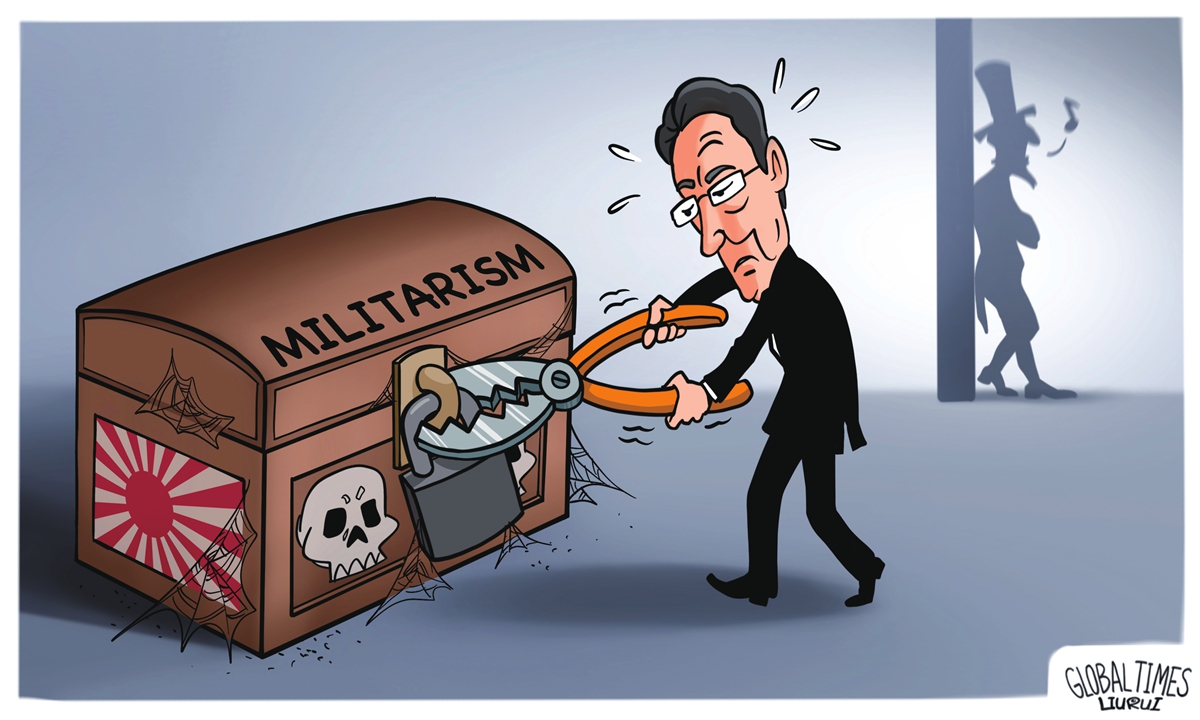
Be careful what you wish for. Illustration: Liu Rui/GT
Japan's ruling Liberal Democratic Party (LDP) scored a sweeping victory in Sunday's House of Councillors election, winning more than half of the seats up for grabs. LDP's coalition partner Komeito won 13 seats. Their victory means political forces, especially the LDP, supportive of revising Japan's pacifist constitution, retain a two-third majority in the upper house, breaking the "threshold" needed to start a motion to amend the constitution.
Japanese Prime Minister Fumio Kishida will not pass by the opportunity when the constitutional revisionists are dominating the upper house. Right-wing tendencies will increase, a constitutional amendment will definitely move forward.
Given the changing security landscape around Japan, the election result is seen as an opportunity for Japan to get rid of the restrictions posed by the post-war pacifist constitution so that Japan can rearm itself and become a "normal country" with an independent army and the permanent power to send troops abroad. This has been a long-term goal established by former prime minister Shinzo Abe, who was assassinated on July 8.
Of course, the possibility of revising the constitution will depend on public opinion in Japan, which is greatly influenced by changes in the security environment on this issue. It will also depend on whether a rearmed Japan will be accepted by the US in its strategic reorientation toward China.
The US played an important role behind the rearmament of West Germany back in the 1950s. The aim was, of course, to consolidate its leadership of the Western bloc, including keeping West Germany in the bloc while preventing it from re-Nazification, to counter the Soviet Union.
France, which had been invaded by Germany several times in the last 100 years of its history, strongly opposed to rearming West Germany. At the time, chancellor of West Germany Konrad Adenauer told French leaders that the threat came not from West Germany's rearmament, but from further East.
A cartoon drawn by German cartoonist Brockmann in January 1955, with the caption, "The enemy is in the East. And what will happen, dear Pierre, when I won't be there to stand between them anymore" took an ironic look at the mistrust of then French Council of Ministers president Pierre Mendès concerning the rearmament of West Germany.
In October 1954, the US, the UK and France negotiated and signed the Paris Agreement with West Germany, legally ending the occupation of West Germany and recognizing the Federal Republic of Germany as a sovereign state.
The Paris Agreement was the starting point for West Germany's reintegration into the Western society and it cleared the diplomatic and political obstacles for West Germany to rebuild its military.
Allied forces stationed in West Germany gradually shifted their focus from their original mission of preventing the resurgence of German militarism to another mission of assisting in the defense of West Germany and Western Europe. West Germany became a member of NATO, and a unified Germany naturally became the backbone of the NATO bloc after 1990.
With the Russia-Ukraine conflict, the security landscape in Europe has once again changed significantly. Germany has launched a plan to increase defense spending. Chancellor Olaf Scholz said on June 7 that Germany would increase military investment to strengthen the protection of NATO's eastern flank, allocate a "special fund" for the modernization of the armed forces, and strengthen NATO's military forces to make Germany "the strongest armed forces in Europe and one of the strongest in NATO."
Similarly, the changing security landscape in East Asia is being made use of by Japanese politicians as a reason to rearm Japan, and public opinion is deeply influenced by it.
The LDP's Research Commission on Security has also recommended that Japan raise military spending to 2 percent of its GDP within five years, citing the rising military capabilities of neighboring countries as a "major threat" to Japan. Kishida recently stated that the Japanese government has no intention of discussing a "nuclear sharing" policy under which the US nuclear weapons would be deployed on Japanese territory for joint use. But there is no problem for the LDP and other parties or Japanese people to discuss the matter.
A scene that happened in Europe seems to be repeating itself in East Asia. This time the "enemy" is perceived to be from the West.
But there is a fundamental difference in East Asia between the Cold War era and now. The three major economies - China, Japan and South Korea - are in a state of deep integration in terms of their economic, trade and civil relations.
Despite the intense competition among the three countries in terms of technology and markets, none of them are willing to completely sever these connections.
Therefore, the future direction of the regional security situation, especially the direction of the US' decoupling strategy toward China, will have a strong impact on this linkage. If the three countries fail to make sustained progress in economic, trade, and civil engagement, the wedge driven by the US will continue to widen the rift.
Thus, Japan's rearmament and the revision of its pacifist constitution is both a Japanese issue and a larger regional security issue, depending on how Japan will respond to the US "Indo-Pacific Strategy" and the rise of China. Whether Japan can rearm itself is a matter for Japan, but if this rearmament is directed at China, it is destined to be a dangerous move.
China does not have to sit idly by on this issue, and China has many options to choose in response.
The author is a senior editor with People's Daily, and currently a senior fellow with the Chongyang Institute for Financial Studies at Renmin University of China. dinggang@globaltimes.com.cn. Follow him on Twitter @dinggangchina




